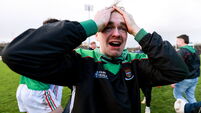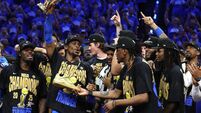Donal Lenihan: McMillan's sharp edge fuelling a Munster revival
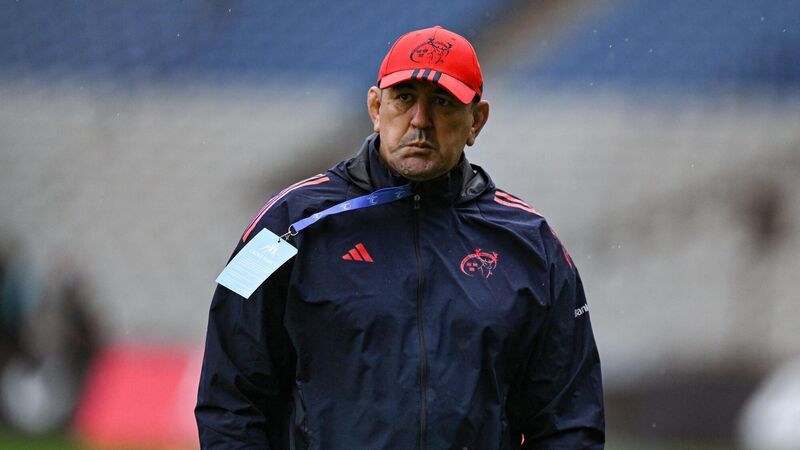
Clayton McMillan's no-nonsense approach is already reshaping Munster. Pic: Brendan Moran/Sportsfile
HOOD up in the rain, it was easy to eavesdrop on conversations on my walk from Croke Park to Connolly Station and the subsequent Dart journey to Sandymount after Munster’s stunning win over Leinster last Saturday.
The chatter from those in blue appeared directed at Leinster coaches Leo Cullen and Jacques Nienaber. Let’s just say it wasn’t positive. On the Dart itself, a father and his young son, proudly bedecked in Munster jerseys, engaged me in conversation and were thrilled with the impact Clayton McMillan has made so early into his Munster tenure.
The complexity surrounding this local derby was encapsulated by this family unit. The dad originally from Blarney but living in Dublin for years. While his younger son sat proudly in Munster colours, his brother, a staunch Leinster fan, sat in silence next to me.
“Why aren’t you wearing red”, I enquired innocently. His response was clear. “I was born and raised in Dublin”. “So was I” replied his younger sibling. It could be a long week in that household.
Given the majority of the Leinster team headed off to Chicago this week to prepare for Ireland’s game against New Zealand on Saturday week, it will be an even longer week for Cullen and Nienaber as they attempt to address this latest defeat which leaves them behind Munster, Ulster and Connacht on the URC league table. Strange times.
For McMillan, despite a trio of URC wins coming into the match, the Leinster game was always going to prove the most informative for the new man at the helm. After an incredible performance he admitted as much post-match. “The barometer or the line in the sand has been drawn now and we’ve just got to keep fighting to be at that level.”
Once again a new head coach finds himself at the helm, Munster’s sixth since Tony McGahan departed the scene in 2012. The last Kiwi coach was former Crusaders Super Rugby-winning supremo Rob Penney.
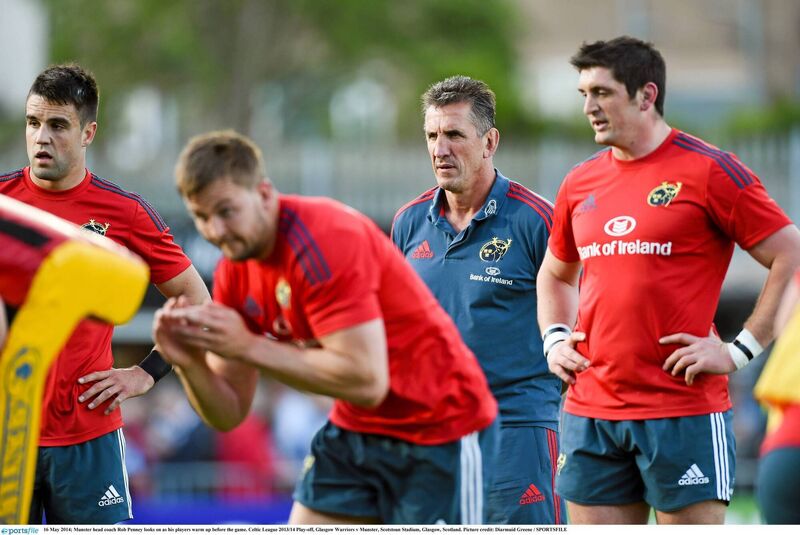
By the time he left, it was clear the experience had broken him. Influenced by an attacking style that saw the Crusaders dominate Super Rugby at the time, Penney was keen to alter Munster’s traditional shape from the outset.
That gigantic leap proved a step too far and it became clear that iconic stalwarts such as Donncha O'Callaghan and Paul O'Connell were not comfortable when asked to man the wide five metre channels. Penney was slightly ahead of his time.
Suffice to say, when offered a one-year extension to his contract, he wasn’t impressed and insisted on two years or he was out the door. The Munster hierarchy were not prepared to budge and another good man was lost.
I sat down with Penney on the eve of his departure to talk through his experience with the province. He made it clear he wanted to stay. By the time we finished, he was in tears, frustrated that he wouldn’t get the opportunity to finish the job.
You get the impression fellow New Zealander McMillan isn’t the type of character that will suffer from tears any time soon. Physically imposing and refreshingly direct, the former police officer is no shrinking violet.
It’s clear he’s not prepared to take any crap from within the camp or, more importantly, from the administrative arm of the organisation. A decent number 8 with over 100 appearances for the Bay of Plenty, McMillan knows his rugby having led the Chiefs to three Super Rugby finals in a row.
Firstly, credit is due to Munster and the IRFU for enticing him here in the first place. Make no mistake, McMillan is highly rated by the NZRU who were very disappointed to see another blossoming coach leave their shores.
That said, past experience has taught them that a stint overseas will not only broaden his horizons but make McMillan a more rounded coach and a valuable commodity down the line if their history with the likes of Graham Henry and Joe Schmidt is anything to go by.
McMillan leaves nothing to chance and did his homework before arriving in Limerick, Penney being just one of those he tapped for an insight and is fully aware of the massive challenge faced in getting the province back to the heady days of the noughties.
The first key step towards imposing his will was in making sure he was allowed appoint his own manager from the Chiefs in Martyn Vercoe to replace Niall O'Donovan. Despite huge local interest in the job, McMillan got his man.
He also fought for the addition of a new strength and conditioning coach in Brad Mayo, which was hugely significant given he inherited his assistant coaches, albeit excellent candidates, in Mike Prendergast and Denis Leamy.
Mayo carries a distinguished CV that boasts time spent working with McMillan at the Chiefs along with the Hurricanes in Wellington. His overseas experience is also significant with stints at the Brumbies in Australia and Scotland’s Glasgow Warriors.
McMillan tasked Mayo with taking the players out of their comfort zone in pre-season. He wanted to see what they were made of. Despite under par performances against Cardiff and Edinburgh, Munster found a way to win games they would probably have lost last season.
On Saturday Munster showed extraordinary resilience against a star-studded Leinster side in with a defensive effort that was off the charts. That ability to stay in the fight is reflective of a clear change in mindset.
The greatest barometer of that was an insatiable appetite and work rate in that key sector. The post-match stats confirmed Munster completed 271 tackles. Leinster only needed to make 117 on the back of enjoying 75% possession in the second half.
That level of competency, under pressure, is testament to the conditioning work done by Mayo to date. McMillan speaks openly about culture and identity. In a throwback to days of yore, that defensive stance spoke volumes.
On RTÉ radio prior to kickoff, I mentioned how Munster have always been at their most dangerous when playing with a chip on their shoulder, when they’re bitter and twisted. When Andy Farrell included 21 Leinster players and only four from Munster in the Irish squad last Wednesday, further fuel was added to the cause.
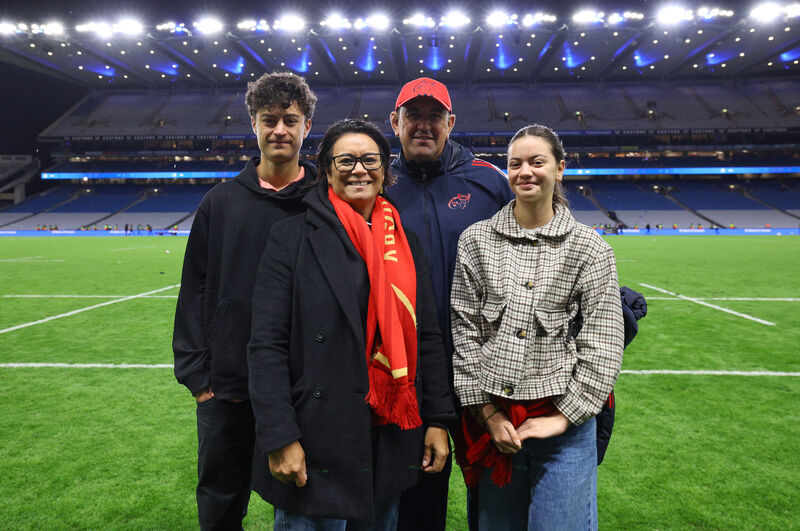
The only problem with that is you can’t rely on it to drive consistency in performance. Despite those narrow wins in rounds two and three, McMillan made it clear he wasn’t happy with aspects of the performances, not least the fact Munster came off second best in the physical exchanges.
After the tight win over Cardiff, he highlighted a key aspect of his playing philosophy. “It’s really hard to get any flow in the game if you're not winning first-up collisions.
“We scored a late try from three dominant carries and we were able to play with a bit of tempo. That’s the game. It's a collision-based game, and you've got to be on the right side of those collisions to impose your game on the opposition.”
The fact McMillan has rotated the team extensively to date, giving every player a chance to fight for a starting place in the bigger games, allowed him make up his own mind on who deserved to start once everyone was available.
That stamp was there for all to see with the selection of young cubs in Edwin Edogbo and Brian Gleeson - how brilliant was he prior to injury - ahead of Jean Kleyn and Gavin Coombes. Clearly stung, both responded in kind with big inputs off the bench when introduced.
The biggest area of concern that McMillan hasn’t been able to solve is the worrying rate of injury and attrition that badly impacted on Munster’s results last season. That and a clear lack of depth in the front row, especially at tighthead prop, could yet derail a hugely encouraging start to the season for a man who can do no wrong at the moment.

